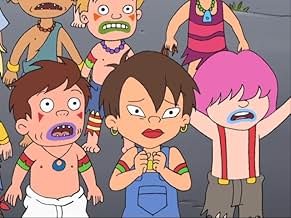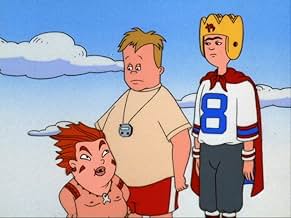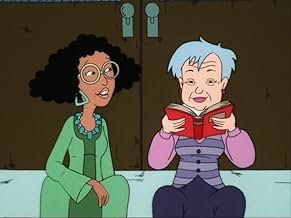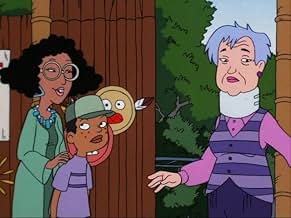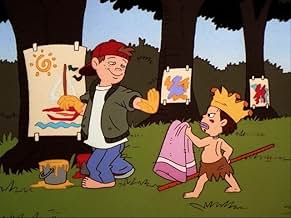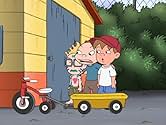AVALIAÇÃO DA IMDb
6,2/10
1 mil
SUA AVALIAÇÃO
Adicionar um enredo no seu idiomaTJ and the gang has their shares of memories as kindergarteners when the kindergarteners captures them.TJ and the gang has their shares of memories as kindergarteners when the kindergarteners captures them.TJ and the gang has their shares of memories as kindergarteners when the kindergarteners captures them.
- Direção
- Roteiristas
- Artistas
Rickey D'Shon Collins
- Vince LaSalle
- (narração)
Jason Davis
- Mikey Blumberg
- (narração)
Ashley Johnson
- Gretchen Grundler
- (narração)
Myles Jeffrey
- T.J. Detweiler
- (narração)
Andrew Lawrence
- Younger T.J.
- (narração)
Ross Malinger
- Older T.J.
- (narração)
Courtland Mead
- Gus Griswald
- (narração)
Pamela Adlon
- Spinelli
- (narração)
- (as Pamela S. Adlon)
Allyce Beasley
- Miss Grotke
- (narração)
April Winchell
- Miss Finster
- (narração)
Dabney Coleman
- Principal Prickley
- (narração)
Klee Bragger
- Digger Sam
- (narração)
Toran Caudell
- King Bob
- (narração)
Rachel Crane
- Ashley Q
- (narração)
Aria Noelle Curzon
- Cornchip Girl
- (narração)
Elizabeth Daily
- Digger #1
- (narração)
- (as E.G. Daily)
Avaliações em destaque
Like all famous Disney series, this is an all-new Playtime. Peering into your favorite characters' pasts, you'll follow the gang's memories when they first arrived at the Third Street school. They are invited by the teacher to spend a day taking care of the terrible Kindergarten. Little ones are impossible: they don't write, they don't play, they're stuck on the playground and they're totally undisciplined. The little ones revolt and, led by Chief Fedorento, "kidnap" TJ. The whole gang panics - TJ is missing. After much confusion, TJ and his friends realize that big boys and little kids can be good friends. After all, one day they were also from Kindergarten. Join in the joy and laughter of THE BEGINNING OF EVERYTHING. A sweet adventure full of important lessons about new friends, self-esteem and the exciting task of growing up.
I thought this one was even cuter than the first one, the mixture of high school children and kindergarten children, brought me nostalgia, a nostalgia for the time when I worked in a daycare center, something more realistic and cute impossible...
I thought this one was even cuter than the first one, the mixture of high school children and kindergarten children, brought me nostalgia, a nostalgia for the time when I worked in a daycare center, something more realistic and cute impossible...
My earliest versions forgot to mention that I found the Recess features to be okay.
They link to series for kids and such series typically have a lower quality than many features, but they are appreciated in a rather different way. Consider these cartoon features as in the genre of series for kids then I find that they rate as okay.
*
I purchased this because it is an Ashley Johnson. She has completed her films as a girl, and many are not easily available, not uncommon. Lionheart (1990), Annie 2 (1995), Dancer (1998), What Women Want (2000), these tell me that there is interesting stuff there.
Her role here is as the voice of an animated character. This is her as a young woman. I guessed who Gretchen was by glancing at a pic and as soon as Gretchen spoke I recognised her as Gretchen. This is blatantly Ashley, but with something feeling wrong.
Recess, characters such as Mikey and Spinelli stood out as solid. My problem was Gretchen seeming distant and flat, as if her soundtrack was processed wrong. I am used to Ashley J having a very real screen presence, visual and sound, an unusual power that was not singing for me here. Was this me not perceiving this DVD right?
Second hearing, the rhythm felt out, how the individuals blended together. But more of the content was feeling solid. I then assumed that I was experiencing a problem that acclimatisation was likely to calm for me. I found the third viewing to be a whole lot better.
Re-watch it recently, Gretchen actually clicked as okay, just Gus seemed way out.
*
How does this portrayal of junior school compare to reality? I am guessing that Billy Madison 1995 might be closer. Except that this includes a stylised portrayal of a Kindergartner regime with quiet and polite children that reminds me of my education in the UK, 1950's and 60's.
In fiction I find such as Paula Danziger, her Earth To Mathew in particular, as strong reminders of quiet and polite not typically being the good health that I thought it to be at the time. I find this a worthwhile topic.
In this, Kindergarten is age 5 and the next step is grade 1. That surprised me as I had thought that grade 1 USA was age 5, as the UK when grades are mentioned here. No. So Scottish Hogwarts of ages 11 to 17-18 as USA grade 6 to 12, and Harriet The Spy, being grade 6 USA, as age 11 going to 12, the year of Hogwarts entry. Stories often assume that this sort of detail is well known, or not relevant?
Things would never be simple? Phyllis Reynolds Naylor's Alice series of novels, rather excellent, uses year numbers to show Alice's progress through Chicago and Washington USA middle and upper schools. Years 1 to 13, 13 being grade 12. MK&A's Two Of A Kind has the twins sent away to a boarding school for ages 11 to 18. Blyton's very English stories about Malory Towers is for ages 12 to 18 and raises the question of upper and lower fourth, a reminder of Bunter's 'Remove', maybe these relate to streaming in year 4, 14 to 15.
*
The DVD I have has this 58ish minute feature plus three additional eleven-ish minute episodes, which are: The Challenge - The Story Of Whomps - One Stayed Clean
They link to series for kids and such series typically have a lower quality than many features, but they are appreciated in a rather different way. Consider these cartoon features as in the genre of series for kids then I find that they rate as okay.
*
I purchased this because it is an Ashley Johnson. She has completed her films as a girl, and many are not easily available, not uncommon. Lionheart (1990), Annie 2 (1995), Dancer (1998), What Women Want (2000), these tell me that there is interesting stuff there.
Her role here is as the voice of an animated character. This is her as a young woman. I guessed who Gretchen was by glancing at a pic and as soon as Gretchen spoke I recognised her as Gretchen. This is blatantly Ashley, but with something feeling wrong.
Recess, characters such as Mikey and Spinelli stood out as solid. My problem was Gretchen seeming distant and flat, as if her soundtrack was processed wrong. I am used to Ashley J having a very real screen presence, visual and sound, an unusual power that was not singing for me here. Was this me not perceiving this DVD right?
Second hearing, the rhythm felt out, how the individuals blended together. But more of the content was feeling solid. I then assumed that I was experiencing a problem that acclimatisation was likely to calm for me. I found the third viewing to be a whole lot better.
Re-watch it recently, Gretchen actually clicked as okay, just Gus seemed way out.
*
How does this portrayal of junior school compare to reality? I am guessing that Billy Madison 1995 might be closer. Except that this includes a stylised portrayal of a Kindergartner regime with quiet and polite children that reminds me of my education in the UK, 1950's and 60's.
In fiction I find such as Paula Danziger, her Earth To Mathew in particular, as strong reminders of quiet and polite not typically being the good health that I thought it to be at the time. I find this a worthwhile topic.
In this, Kindergarten is age 5 and the next step is grade 1. That surprised me as I had thought that grade 1 USA was age 5, as the UK when grades are mentioned here. No. So Scottish Hogwarts of ages 11 to 17-18 as USA grade 6 to 12, and Harriet The Spy, being grade 6 USA, as age 11 going to 12, the year of Hogwarts entry. Stories often assume that this sort of detail is well known, or not relevant?
Things would never be simple? Phyllis Reynolds Naylor's Alice series of novels, rather excellent, uses year numbers to show Alice's progress through Chicago and Washington USA middle and upper schools. Years 1 to 13, 13 being grade 12. MK&A's Two Of A Kind has the twins sent away to a boarding school for ages 11 to 18. Blyton's very English stories about Malory Towers is for ages 12 to 18 and raises the question of upper and lower fourth, a reminder of Bunter's 'Remove', maybe these relate to streaming in year 4, 14 to 15.
*
The DVD I have has this 58ish minute feature plus three additional eleven-ish minute episodes, which are: The Challenge - The Story Of Whomps - One Stayed Clean
Okay, first thing to note going into this is that, well, don't expect the entire thing to be a completely new story. They actually take what I like to call the old Loony Tunes approach and create a story that's basically an excuse to showcase older episodes, though in this case, they all have a particular theme to them, specifically the kids building a friendship with the kindergartners. As such, we're treated to 3 classic episodes, but what makes this film worth it is the addition of a 4th new story, specifically back when Gus was in kindergarten. For the most part, it's fine. I can at least believe most of it, but there is one major plot hole that kind of removes whatever credibility the writers clearly wanted us to think it had. See, it's revealed that Gus actually had the same kindergarten class as the others, and while this is questionable at first, they not only address the obvious plot hole here but also come up with a generally good reason, that being that the others can only remember a fraction of their kindergarten years and thus it makes sense that they wouldn't remember all of this. However, it does not explain why, if Gus had a good enough memory to remember this, he genuinely had no idea who all five were when he first appeared in the series. I wouldn't mind this so much, except this show is actually pretty good when it comes to continuity. They have a nice concept here, with Gus actually being the one who helped all five of the others find their callings, and even the whole subplot with Mikey picking on the other kids was confusing at first but made sense when you found out why he did it. (It also ties into Randal once telling his father that Mikey used to be a schoolyard bully... that's actually kinda neat) Again, I do feel like that one small detail from the first episode kind of contradicts a lot of the forth story, but it's still fine and I like the setup enough that this is more of a nitpick. Again, maybe if the film had been all new material and the main story tying it all together wasn't so paper thin, I'd recommend this more, but if you're a die-hard Recess fan looking for a nostalgia trip, I'd say this is worth seeking out.
A tedious watch. Non-fans of the show won't like this.
'Recess: All Growed Down' is another compilation film, though at least this one has a firmer overall theme to it unlike 'Recess Christmas: Miracle On Third Street'. The story features the kindergarten kids, which is mildly interesting but it's dumbed-down a little - this feels aimed solely at children, way more than the preceding two productions anyway.
Andrew Lawrence's absence as T.J. is surprisingly noticeable, his replacement's voice probably adds to what I mentioned earlier in terms of sounding more kiddy. None of the rest of the cast are noteworthy.
Evidently people seem to like this film, fair enough I guess. It isn't one I enjoyed though.
'Recess: All Growed Down' is another compilation film, though at least this one has a firmer overall theme to it unlike 'Recess Christmas: Miracle On Third Street'. The story features the kindergarten kids, which is mildly interesting but it's dumbed-down a little - this feels aimed solely at children, way more than the preceding two productions anyway.
Andrew Lawrence's absence as T.J. is surprisingly noticeable, his replacement's voice probably adds to what I mentioned earlier in terms of sounding more kiddy. None of the rest of the cast are noteworthy.
Evidently people seem to like this film, fair enough I guess. It isn't one I enjoyed though.
It's like about 3/5 of this movie is compilation of the episodes from the series (lazily shown in flashbacks): "The Legend of Big Kid", "Wild Child", and "The Kindergarten Derby". Then comes the finale: the movie shows the whole Recess gang as kindergarteners, including, in "Wild Child", Gus Griswald. This retrons Gus' earlier introduction as a new student at school, by showing that when new kindergartener Gus wreaks havoc and causing the other Recess gang kindergarteners to rebel against Miss Finster and kindergartener Randall. Gus is later sent to another, out of sate school and soon forgets his Recess friends, and they in turn, forget Gus, viewing him as a new student when he appears in second episode: "The New Kid". This is some plot hole.
Você sabia?
- Erros de gravaçãoThe movie shows the whole Recess gang as kindergärtners, including, in "Wild Child", Gus Griswald. This retrons Gus' earlier introduction as a new student at school, by showing that when new kindergärtner Gus wreaks havoc and causing the other Recess gang kindergärtners to rebel against Ms Finster and kindergärtner Randall, Gus is later sent to another, out of sate school and soon forgets his Recess friends, and they in turn, forget Gus, viewing him as a new student when he appears in 1:2, "The New Kid".
- ConexõesEdited from Hora do Recreio: The Legend of Big Kid (1997)
Principais escolhas
Faça login para avaliar e ver a lista de recomendações personalizadas
Detalhes
- Data de lançamento
- País de origem
- Central de atendimento oficial
- Idioma
- Também conhecido como
- Recess: All Growed Down
- Empresas de produção
- Consulte mais créditos da empresa na IMDbPro
- Tempo de duração
- 1 h 1 min(61 min)
- Cor
- Proporção
- 1.33 : 1
Contribua para esta página
Sugerir uma alteração ou adicionar conteúdo ausente


